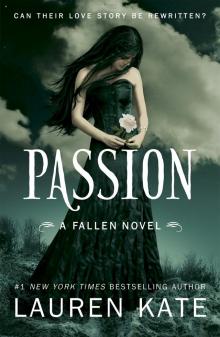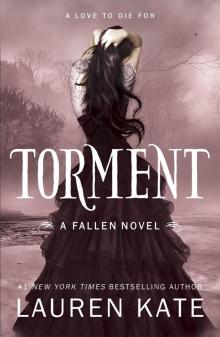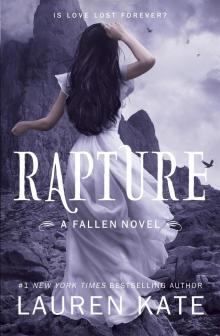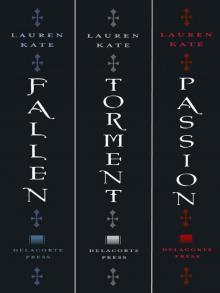- Home
- Lauren Kate
The Fallen Sequence: An Omnibus Edition Page 2
The Fallen Sequence: An Omnibus Edition Read online
Page 2
One phone call … once a week? But—
She looked down at her phone one last time and saw that she’d received two new text messages. It didn’t seem possible that these would be her two last text messages. The first one was from Callie.
Call immediately! Will be waiting by the phone all nite so be ready to dish. And remember the mantra I assigned you. You’ll survive! BTW, for what it’s worth, I think everyone’s totally forgotten about …
In typical Callie fashion, she’d gone on so long that Luce’s crap cell phone cut the message off four lines in. In a way, Luce was almost relieved. She didn’t want to read about how everyone from her old school had already forgotten what had happened to her, what she’d done to land herself in this place.
She sighed and scrolled down to her second message. It was from her mom, who’d only just gotten the hang of texting a few weeks ago, and who surely had not known about this one-call-once-a-week thing or she would never have abandoned her daughter here. Right?
Kiddo, we are always thinking of you. Be good and try to eat enough protein. We’ll talk when we can. Love, M&D
With a sigh, Luce realized her parents must have known. How else to explain their drawn faces when she’d waved goodbye at the school gates this morning, duffel bag in hand? At breakfast, she’d tried to joke about finally losing that appalling New England accent she’d picked up at Dover, but her parents hadn’t even cracked a smile. She’d thought they were still mad at her. They never did the whole raising-their-voice thing, which meant that when Luce really messed up, they just gave her the old silent treatment. Now she understood this morning’s strange demeanor: Her parents were already mourning the loss of contact with their only daughter.
“We’re still waiting on one person,” the attendant sang. “I wonder who it is.” Luce’s attention snapped back to the Hazard Box, which was now brimming with contraband she didn’t even recognize. She could feel the dark-haired boy’s green eyes staring at her. She looked up and noticed that everyone was staring. Her turn. She closed her eyes and slowly opened her fingers, letting her phone slip from her grasp and land with a sad thunk on top of the heap. The sound of being all alone.
Todd and the fembot Gabbe headed for the door without so much as a look in Luce’s direction, but the third boy turned to the attendant.
“I can fill her in,” he said, nodding at Luce.
“Not part of our deal,” the attendant replied automatically, as if she’d been expecting this dialogue. “You’re a new student again—that means new-student restrictions. Back to square one. You don’t like it, you should have thought twice before breaking parole.”
The boy stood motionless, expressionless, as the attendant tugged Luce—who’d stiffened at the word “parole”—toward the end of a yellowed hall.
“Moving on,” she said, as if nothing had just happened. “Beds.” She pointed out the west-facing window to a distant cinder-block building. Luce could see Gabbe and Todd shuffling slowly toward them, with the third boy walking slowly, as if catching up to them were the last thing on his list of things to do.
The dorm was formidable and square, a solid gray block of a building whose thick double doors gave away nothing about the possibility of life inside them. A large stone plaque stood planted in the middle of the dead lawn, and Luce remembered from the Web site the words PAULINE DORMITORY chiseled into it. It looked even uglier in the hazy morning sun than it had looked in the flat black-and-white photograph.
Even from this distance, Luce could see black mold covering the face of the dorm. All the windows were obstructed by rows of thick steel bars. She squinted. Was that barbed wire topping the fence around the building?
The attendant looked down at a chart, flipping through Luce’s file. “Room sixty-three. Throw your bag in my office with the rest of them for now. You can unpack this afternoon.”
Luce dragged her red duffel bag toward three other nondescript black trunks. Then she reached reflexively for her cell phone, where she usually keyed in things she needed to remember. But as her hand searched her empty pocket, she sighed and committed the room number to memory instead.
She still didn’t see why she couldn’t just stay with her parents; their house in Thunderbolt was less than a half hour from Sword & Cross. It had felt so good to be back home in Savannah, where, as her mom always said, even the wind blew lazily. Georgia’s softer, slower pace suited Luce way more than New England ever had.
But Sword & Cross didn’t feel like Savannah. It hardly felt like anywhere at all, except the lifeless, colorless place where the court had mandated she board. She’d overheard her dad on the phone with the headmaster the other day, nodding in his befuddled biology-professor way and saying, “Yes, yes, maybe it would be best for her to be supervised all the time. No, no, we wouldn’t want to interfere with your system.”
Clearly her father had not seen the conditions of his only daughter’s supervision. This place looked like a maximum-security prison.
“And what about, what did you say—the reds?” Luce asked the attendant, ready to be released from the tour.
“Reds,” the attendant said, pointing toward a small wired device hanging from the ceiling: a lens with a flashing red light. Luce hadn’t seen it before, but as soon as the attendant pointed the first one out, she realized they were everywhere.
“Cameras?”
“Very good,” the attendant said, voice dripping condescension. “We make them obvious in order to remind you. All the time, everywhere, we’re watching you. So don’t screw up—that is, if you can help yourself.”
Every time someone talked to Luce like she was a total psychopath, she came that much closer to believing it was true.
All summer, the memories had haunted her, in her dreams and in the rare moments her parents left her alone. Something had happened in that cabin, and everyone (including Luce) was dying to know exactly what. The police, the judge, the social worker had all tried to pry the truth out of her, but she was as clueless about it all as they were. She and Trevor had been joking around the whole evening, chasing each other down to the row of cabins on the lake, away from the rest of the party. She’d tried to explain that it had been one of the best nights of her life, until it turned into the worst.
She’d spent so much time replaying that night in her head, hearing Trevor’s laugh, feeling his hands close around her waist, and trying to reconcile her gut instinct that she really was innocent.
But now, every rule and regulation at Sword & Cross seemed to work against that notion, seemed to suggest that she was, in fact, dangerous and needed to be controlled.
Luce felt a firm hand on her shoulder.
“Look,” the attendant said. “If it makes you feel any better, you’re far from the worst case here.”
It was the first humane gesture the attendant had made toward Luce, and she believed that it was intended to make her feel better. But. She’d been sent here because of the suspicious death of the guy she’d been crazy about, and still she was “far from the worst case here”? Luce wondered what else exactly they were dealing with at Sword & Cross.
“Okay, orientation’s over,” the attendant said. “You’re on your own now. Here’s a map if you need to find anything else.” She gave Luce a photocopy of a crude hand-drawn map, then glanced at her watch. “You’ve got an hour before your first class, but my soaps come on in five, so”—she waved her hand at Luce—“make yourself scarce. And don’t forget,” she said, pointing up at the cameras one last time. “The reds are watching you.”
Before Luce could reply, a skinny, dark-haired girl appeared in front of her, wagging her long fingers in Luce’s face.
“Ooooooh,” the girl taunted in a ghost-story-telling voice, dancing around Luce in a circle. “The reds are watching youuuu.”
“Get out of here, Arriane, before I have you lobotomized,” the attendant said, though it was clear from her first brief but genuine smile that she had some coarse affection for the cr
azy girl.
It was also clear that Arriane did not reciprocate the love. She mimed a jerking-off motion at the attendant, then stared at Luce, daring her to be offended.
“And just for that,” the attendant said, jotting a furious note in her book, “you’ve earned yourself the task of showing Little Miss Sunshine around today.”
She pointed at Luce, who looked anything but sunny in her black jeans, black boots, and black top. Under the “Dress Code” section, the Sword & Cross Web site had cheerily maintained that as long as the students were on good behavior, they were free to dress as they pleased, with just two small stipulations: style must be modest and color must be black. Some freedom.
The too-big mock turtleneck Luce’s mom had forced on her this morning did nothing for her curves, and even her best feature was gone: Her thick black hair, which used to hang down to her waist, had been almost completely shorn off. The cabin fire had left her scalp singed and her hairline patchy, so after the long, silent ride home from Dover, Mom had planted Luce in the bathtub, brought out Dad’s electric razor, and wordlessly shaved her head. Over the summer, her hair had grown out a little, just enough so that her once-enviable waves now hovered in awkward twists just below her ears.
Arriane sized her up, tapping one finger against her pale lips. “Perfect,” she said, stepping forward to loop her arm through Luce’s. “I was just thinking I could really use a new slave.”
The door to the lobby swung open and in walked the tall kid with green eyes. He shook his head and said to Luce, “This place isn’t afraid to do a strip search. So if you’re packing any other hazards”—he raised an eyebrow and dumped a handful of unrecognizables in the box—“save yourself the trouble.”
Behind Luce, Arriane laughed under her breath. The boy’s head shot up, and when his eyes registered Arriane, he opened his mouth, then closed it, like he was unsure how to proceed.
“Arriane,” he said evenly.
“Cam,” she returned.
“You know him?” Luce whispered, wondering whether there were the same kinds of cliques in reform schools as there were in prep schools like Dover.
“Don’t remind me,” Arriane said, dragging Luce out the door into the gray and swampy morning.
The back of the main building let out onto a chipped sidewalk bordering a messy field. The grass was so overgrown, it looked more like a vacant lot than a school commons, but a faded scoreboard and a small stack of wooden bleachers argued otherwise.
Beyond the commons lay four severe-looking buildings: the cinder-block dormitory on the far left, a huge old ugly church on the far right, and two other expansive structures in between that Luce imagined were the classrooms.
This was it. Her whole world was reduced to the sorry sight before her eyes.
Arriane immediately veered right off the path and led Luce to the field, sitting her down on top of one of the waterlogged wooden bleachers.
The corresponding setup at Dover had screamed Ivy League jock-in-training, so Luce had always avoided hanging out there. But this empty field, with its rusted, warped goals, told a very different story. One that wasn’t as easy for Luce to figure out. Three turkey vultures swooped overhead, and a dismal wind whipped through the bare branches of the oak trees. Luce ducked her chin down into her mock turtleneck.
“Soooo,” Arriane said. “Now you’ve met Randy.”
“I thought his name was Cam.”
“We’re not talking about him,” Arriane said quickly. “I mean she-man in there.” Arriane jerked her head toward the office where they’d left the attendant in front of the TV. “Whaddya think—dude or chick?”
“Uh, chick?” Luce said tentatively. “Is this a test?”
Arriane cracked a smile. “The first of many. And you passed. At least, I think you passed. The gender of most of the faculty here is an ongoing, schoolwide debate. Don’t worry, you’ll get into it.”
Luce thought Arriane was making a joke—in which case, cool. But this was all such a huge change from Dover. At her old school, the green-tie-wearing, pomaded future senators had practically oozed through the halls in the genteel hush that money seemed to lay over everything.
More often than not, the other Dover kids gave Luce a don’t-smudge-the-white-walls-with-your-fingerprints side ways glance. She tried to imagine Arriane there: lazing on the bleachers, making a loud, crude joke in her peppery voice. Luce tried to imagine what Callie might think of Arriane. There’d been no one like her at Dover.
“Okay, spill it,” Arriane ordered. Plopping down on the top bleacher and motioning for Luce to join her, she said, “What’d ya do to get in here?”
Arriane’s tone was playful, but suddenly Luce had to sit down. It was ridiculous, but she’d half expected to get through her first day of school without the past creeping up and robbing her of her thin façade of calm. Of course people here were going to want to know.
She could feel the blood thrumming at her temples. It happened whenever she tried to think back—really think back—to that night. She’d never stop feeling guilty about what had happened to Trevor, but she also tried really hard not to get mired down in the shadows, which by now were the only things she could remember about the accident. Those dark, indefinable things that she could never tell anyone about.
Scratch that—she’d started to tell Trevor about the peculiar presence she’d felt that night, about the twisting shapes hanging over their heads, threatening to mar their perfect evening. Of course, by then it was already too late. Trevor was gone, his body burned beyond recognition, and Luce was … was she … guilty?
No one knew about the murky shapes she sometimes saw in the darkness. They’d always come to her. They’d come and gone for so long that Luce couldn’t even remember the first time she’d seen them. But she could remember the first time she realized that the shadows didn’t come for everyone—or actually, anyone but her. When she was seven, her family had been on vacation in Hilton Head and her parents had taken her on a boat trip. It was just about sunset when the shadows started rolling in over the water, and she’d turned to her father and said, “What do you do when they come, Dad? Why aren’t you afraid of the monsters?”
There were no monsters, her parents assured her, but Luce’s repeated insistence on the presence of something wobbly and dark had gotten her several appointments with the family eye doctor, and then glasses, and then appointments with the ear doctor after she made the mistake of describing the hoarse whooshing noise that the shadows sometimes made—and then therapy, and then more therapy, and finally the prescription for anti-psychotic medication.
But nothing ever made them go away.
By the time she was fourteen, Luce refused to take her meds. That was when they found Dr. Sanford, and the Dover School nearby. They flew to New Hampshire, and her father drove their rental car up a long, curved driveway to a hilltop mansion called Shady Hollows. They planted Luce in front of a man in a lab coat and asked her if she still saw her “visions.” Her parents’ palms were sweating as they gripped her hands, brows furrowed with the fear that there was something terribly wrong with their daughter.
No one came out and said that if she didn’t tell Dr. Sanford what they all wanted her to say, she might be seeing a whole lot more of Shady Hollows. When she lied and acted normal, she was allowed to enroll at Dover, and only had to visit Dr. Sanford twice a month.
Luce had been permitted to stop taking the horrible pills as soon as she started pretending she didn’t see the shadows anymore. But she still had no control over when they might appear. All she knew was that the mental catalog of places where they’d come for her in the past—dense forests, murky waters—became the places she avoided at all costs. All she knew was that when the shadows came, they were usually accompanied by a cold chill under her skin, a sickening feeling unlike anything else.
Luce straddled one of the bleachers and gripped her temples between her thumbs and middle fingers. If she was going to make it through today, she h
ad to push her past to the recesses of her mind. She couldn’t stand probing the memory of that night by herself, so there was no way she could air all the gruesome details to some weird, maniacal stranger.
Instead of answering, she watched Arriane, who was lying back on the bleachers, sporting a pair of enormous black sunglasses that covered the better part of her face. It was hard to tell, but she must have been staring at Luce, too, because after a second, she shot up from the bleachers and grinned.
“Cut my hair like yours,” she said.
“What?” Luce gasped. “Your hair is beautiful.”
It was true: Arriane had the long, thick locks that Luce so desperately missed. Her loose black curls sparkled in the sunlight, giving off just a tinge of red. Luce tucked her hair behind her ears, even though it still wasn’t long enough to do anything but flop back down in front of them.
“Beautiful schmootiful,” Arriane said. “Yours is sexy, edgy. And I want it.”
“Oh, um, okay,” Luce said. Was that a compliment? She didn’t know if she was supposed to be flattered or unnerved by the way Arriane assumed she could have whatever she wanted, even if what she wanted belonged to someone else. “Where are we going to get—”
“Ta-da!” Arriane reached into her bag and pulled out the pink Swiss Army knife Gabbe had tossed into the Hazard Box. “What?” she said, seeing Luce’s reaction. “I always bring my sticky fingers on new-student drop-off days. The idea alone gets me through the dog days of Sword & Cross internment … er … summer camp.”
“You spent the whole summer … here?” Luce winced.
“Ha! Spoken like a true newbie. You’re probably expecting a spring break.” She tossed Luce the Swiss Army knife. “We don’t get to leave this hellhole. Ever. Now cut.”

 Fallen in Love
Fallen in Love Last Day of Love: A Teardrop Story
Last Day of Love: A Teardrop Story Teardrop
Teardrop Passion
Passion Fallen
Fallen Torment
Torment Waterfall
Waterfall Rapture
Rapture Unforgiven
Unforgiven The Betrayal of Natalie Hargrove
The Betrayal of Natalie Hargrove The Orphan's Song
The Orphan's Song The Fallen Sequence: An Omnibus Edition
The Fallen Sequence: An Omnibus Edition Teardrop (Teardrop Trilogy 1)
Teardrop (Teardrop Trilogy 1) Fallen_Angels in the Dark
Fallen_Angels in the Dark